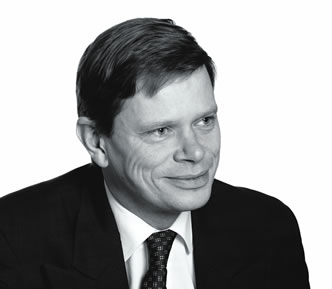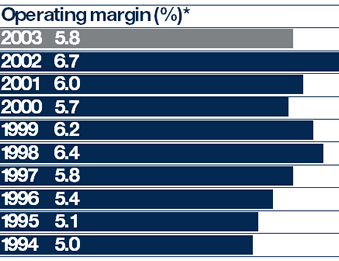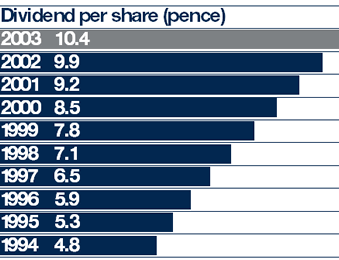| The Group’s sales at £567.5m were 11% higher than in 2002. This increase reflects a full year’s contribution from the acquisitions completed in 2002, most notably McKinney and Keller-Terra, both of which were not acquired until December 2002. |
 |
| Trading results The Group’s sales at £567.5m were 11% higher than in 2002. This increase reflects a full year’s contribution from the acquisitions completed in 2002, most notably McKinney and Keller-Terra, both of which were not acquired until December 2002. Movements in reported sales and profits were also significantly influenced by fluctuations in foreign currency exchange rates. The average US dollar exchange rate against sterling weakened by 9% in the year, while the average euro exchange rate strengthened by 9%. Stripping out the effects of both acquisitions and currency movements, the Group’s like for like 2003 sales were 1% down on 2002. Operating profit before exceptional items and the amortisation of intangibles was £32.8m, compared to £34.3m in 2002, despite an encouraging first year contribution from both McKinney and Keller-Terra which, taken together, exceeded our expectations. The 2003 result is stated after a £0.9m net adverse currency impact, primarily due to the weaker US dollar, and an underlying loss at the Group’s Makers business of £0.9m. The Makers loss compares to a £2.8m operating profit in the previous year, despite having acquired Accrete in August 2002. Excluding the impact of both acquisitions and currency, the operating profit of the Group’s core specialist ground engineering businesses was slightly down on 2002. As a result of the disappointing year at Makers, an exceptional goodwill impairment charge of £7.4m has been charged to the profit and loss account, representing all of the remaining capitalised goodwill relating to Makers. The results also include £3.1m of exceptional restructuring costs associated with the Group’s two UK businesses, mainly comprising redundancy costs, the write-down of fixed assets and office closure costs. Of this amount, £1.4m relates to Makers. Interest The net interest charge increased from £3.9m in 2002 to £4.2m in 2003. This increase reflects higher average net debt, as a result of the acquisitions in the second half of 2002, partly offset by lower average interest rates. Around half of the Group’s net debt is subject to floating rates with the other half subject to fixed rates until September 2004. Interest cover remains comfortable at over ten times EBITDA. Tax The Group’s average effective tax rate, before exceptional items and amortisation of intangibles, was 39%, up from 35% in 2002. This is relatively high compared to most UK-based groups reflecting the fact that the vast majority of the Group’s profits are earned in higher tax jurisdictions, in particular the United States where the effective combined federal and state tax rates are nearly 40%. The increase in the effective rate from 2002 is mainly due to incurring unrelieved 2003 taxable losses in the UK, as a result of the disappointing trading performance at Makers and the exceptional restructuring costs. Earnings and dividends The minority interest charge increased from £0.2m to £1.8m, reflecting the 49% minority in Keller-Terra and, to a lesser extent, an excellent year at LCM which was only 50% owned until the Group acquired the other half in January 2004. The weighted average number of shares in issue increased by 9% as a result of the shares issued in December 2002 in connection with the acquisitions of Keller-Terra and McKinney. These, combined with the lower Group profits, resulted in a decrease of 26% in adjusted earnings per share (before exceptional items and amortisation of intangibles). Following the recommendation of an increased final dividend of 6.95p per share, the total dividend for the year is 10.4p, an increase of 5% on 2002. This is covered 2.3 times by adjusted earnings per share or 1.8 times if the recurring amortisation of intangibles is deducted. Cash flow and net debt Net cash inflow from operating activities was £40.0m, representing 98% of the Group’s EBITDA. This compares to £43.2m and 100% in 2002. This is a pleasing outcome in a difficult year and is a testament to the ongoing strength of the Group’s cash conversion and the continuing focus on cash generation. Year-end working capital was maintained at last year’s levels, despite the significantly higher cost of Suncoast’s raw materials and strong growth in geographies, such as southern Europe, which traditionally have higher working capital requirements. Capital expenditure decreased marginally in the year, although the proceeds from the sale of fixed assets also fell. Net capital expenditure in the year was £13.4m, which represents 1.2 times depreciation. After paying tax, interest and dividends, year-end net debt decreased from £68.0m at 31 December 2002 to £60.7m at the end of 2003. Of this reduction, £4.6m is due to exchange differences, mainly on the retranslation of the Group’s US dollar denominated debt. This is held as a hedge against the Group’s dollar denominated net assets. At the year end US dollar denominated net assets were about 80% hedged. Net debt at the year end represents 1.5 times EBITDA. Based on net assets of £97.6m, gearing was 62%, down from 68% at the beginning of the year. Pensions The Group offers defined benefit pension arrangements in the UK, Germany and Austria. The last actuarial valuation of the UK scheme, which has been closed to new members since 1999, was as at 5 April 2002. At this date, the market value of the scheme’s assets was £14.6m and the valuation concluded that the scheme was 79% funded on an ongoing basis. In order to reduce the deficit, the Group has subsequently increased both the employee and employer contribution rates. The transitional disclosures required by FRS 17 are shown in note 29 of these financial statements. These show that, as at 31 December 2003, the pre-tax deficit in the UK scheme was £6.0m on an FRS 17 basis, down from £6.5m at the end of 2002. In Germany and Austria, there are no segregated funds to cover defined benefit retirement obligations for the German and Austrian employees. Instead, the respective liabilities are included within creditors on the Group balance sheet. All other pension provisions in the Group are of a defined contribution nature. Accounting standards The Group’s report and accounts have been prepared in accordance with applicable UK accounting standards (UK GAAP). These accounts have not been significantly impacted by any new accounting standards. Looking forward, the Group’s accounts must comply with International Financial Reporting Standards (IFRS) with effect from 2005. The Group has performed an initial review of the extent to which the differences between UK GAAP and IFRS might impact its accounts. This exercise indicates that, while there will be some significant changes in disclosure, the impact of differences between existing UK GAAP and IFRS is not likely to be material to the Group’s results. However, the International Accounting Standards Board, which develops and issues IFRS, has significant ongoing projects that could affect the differences between current UK GAAP and IFRS. The actual impact on the Group’s financial statements of the adoption of IFRS will therefore depend on the standards applicable and the particular circumstances prevailing on 1 January 2005. James Hind Finance Director 11 March 2004 |
  |
| * before exceptional items and amortisation of intangibles |